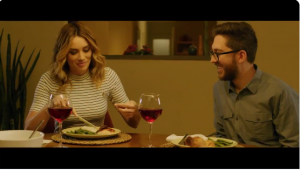
‘Lonely and Horny’ review
By Jacey Gibb, Distribution Manager
1/5
The jokesters over at CollegeHumor launched their own comedy streaming platform Dropout TV. I’m here to tell you if their exclusive content is worth the subscription fee.
The web series Jake and Amir was one of CollegeHumor’s breakout hits back in the late 2000s. The series had a simple premise: Jake Hurwitz and Amir Blumenfeld played fictionalized versions of themselves in an office, with Hurwitz as the comedic straight man to Blumenfeld’s outlandish version of himself.
In 2015, the pair left CollegeHumor to pursue their own projects and ultimately found a home on Vimeo, where they launched Lonely and Horny. The two returned for co-starring roles, except this time Hurwitz played a dating coach named Josh Rice trying to help Blumenfeld’s hapless character Ruby Jade get laid. Lonely and Horny is back for season two, but now as a Dropout TV exclusive.
The season two premiere centres on Ruby’s return to Josh’s pick-up artist class (the same room season one started in), except this time Ruby trumpets his personal success to the fresh crop of wannabe pick-up masters. After starting a chant of his own name—which the students strangely join in on—Ruby suggests becoming Josh’s teaching assistant. Here we get a hint at what the new season will feature.
The premise of Lonely and Horny largely revolves on Ruby’s quest for romance. He’s the underdog we’re supposed to be rooting for, yet Ruby’s almost unilaterally unlikeable.
Take the show’s pilot episode, for example: Ruby’s out on a date when the woman he’s with starts hitting it off with their smooth-talking bartender. What is Ruby’s natural reaction? It is to start belittling the bartender and go on the offensive. As a hail-Mary move, Ruby tries kissing his date as he’s settling the bill, even though by this point she’s left the table and is sitting comfortably at the bar. We then cut to Ruby later that night, sulkily dunking cookies into milk and scrolling through a dating app with some sentimental indie-rock playing in the background.
The whole setup feels unearned because of how horribly Ruby reacted. I’m only describing the pilot, but most Lonely and Horny episodes follow a similar pattern of Ruby going on a date where it starts suspiciously well until he does or says something to ruin the whole experience. The punchline generally is Ruby asking for a follow-up date and being rejected, for obvious reasons.
It’s not like shitty characters are a new feature to television’s comedic landscape. Think back to protagonists like Michael Scott from The Office, or Seinfeld’s four leads: All truly terrible people who do terrible things to the unfortunate souls who end up in their proximity. These characters possess other redeemable qualities though, so there are moments of genuine character development or sincerity in their roles. The moments where we peeked under their armour felt earned—something that’s completely lacking for Lonely and Horny’s Ruby.
Hurwitz’s character, however, continues to be an underused but interesting component to the show. Halfway through the first season, Josh’s cover as a womanizing pick-up artist was blown when Ruby met his wife and toddler at a grocery store. Josh is tired and stressed out about life, but he’s also happily married and loves his family, which makes his role as a pick-up instructor more intriguing. The parallels between Josh and Ruby are obvious, with the two even outright discussing how Josh envies his former student’s bachelorhood freedom in the second season. Lonely and Horny seems dead-set on making Ruby the lead though, so we go entire episodes without Josh, which seems like a waste.
It’s also impossible to review the new season and not refer to how horrifically toxic some of the dialogue and actions are. Throughout the first season, women were repeatedly referred to as “targets,” while scenes in Josh’s pick-up classroom featured cringeworthy dialogue like “turn your matches into snatches.” The bro-ness seems turned down in these newer episodes, but the whole backdrop on which season one was based remains.
A show that explores dating and relationships in the era of apps is a promising premise, which is probably why Lonely and Horny feels so disappointing. Between the two seasons, there was an opportunity to correct the show’s trajectory. Ditch the pick-up artist angle and classroom scenes; give Hurwitz more screen time; and tone Ruby’s toxic narcissism way the fuck down. Any of these could have made Lonely and Horny more watchable. Instead we’re stuck with more of the same, in a second season that’s about as relevant as a MySpace page.
The first four episodes of Lonely and Horny season two are available on Dropout TV.


